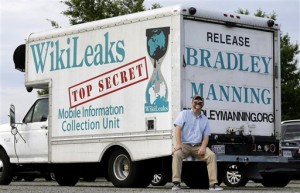US says Manning leak hurt human rights work

In this June 17, 2013 photo, Clark Stoeckley poses with a box truck in Fort Meade, Md., that he painted in support of Army Pfc. Bradley Manning. Stoeckley a supporter of Pfc. Manning has been accused of posting threatening messages on the Internet and a judge has banned him from the courtroom for the rest of the soldier’s trial. Manning is being tried by Judge Denise Lind, an Army colonel, on charges he leaked hundreds of thousands of government documents to the anti-secrecy site WikiLeaks. AP
FORT MEADE, Maryland— A U.S. State Department official says the 250,000 diplomatic cables that soldier Bradley Manning disclosed through WikiLeaks hurt the department’s ability to advance human rights because some foreign citizens were endangered and some activists became reluctant to seek U.S. help.
Acting Assistant Secretary Michael Kozak testified Friday at Manning’s sentencing hearing. Prosecutors are trying to show that the leaks harmed U.S. interests, while the defense says they didn’t. Manning has said he leaked the material to expose wrongdoing by the military and U.S. diplomats.
Manning faces up to 136 years in prison for leaking classified information to the anti-secrecy group while working as an intelligence analyst in Iraq in 2010. The 25-year-old was convicted Tuesday of 20 of 22 counts, including Espionage Act violations, theft and computer fraud. He was acquitted of the most serious charge, aiding the enemy.
Kozak said the cables identified people who had worked with the United States, putting them at risk of death, violence or incarceration. He said the department helped some of those people relocate.
“We had a moral obligation” to protect people who had spoken to diplomats in confidence, Kozak said.
He declined to say publicly how many people his working group determined to be at risk. He said he would provide the number in a session closed to spectators and reporters that followed his open-court testimony. Prosecutors requested the closed session to protect classified information.
Kozak said the greatest damage to State Department human-rights efforts was a “chilling effect” on foreign activists seeking U.S. help.
“They can’t be sure now whether what they say to us is going to remain confidential or whether it’s going to be broadcast around,” Kozak said.
Earlier Friday, the department’s former computer chief testified that it wasn’t her fault that the diplomatic cables were stolen and leaked.
Manning’s top-secret security clearance gave him access to a classified government computer network that included the cables.
“I believed that the intent of the system was correct: If you’re on a system and you’re cleared to handle classified information, that you’re going to handle it appropriately,” said Susan Swart, now chief information officer for the International Monetary Fund.
She said that after WikiLeaks began publishing the leaked cables, the department quickly moved such material to a more restricted network, where users had to justify their desire to read the cables.